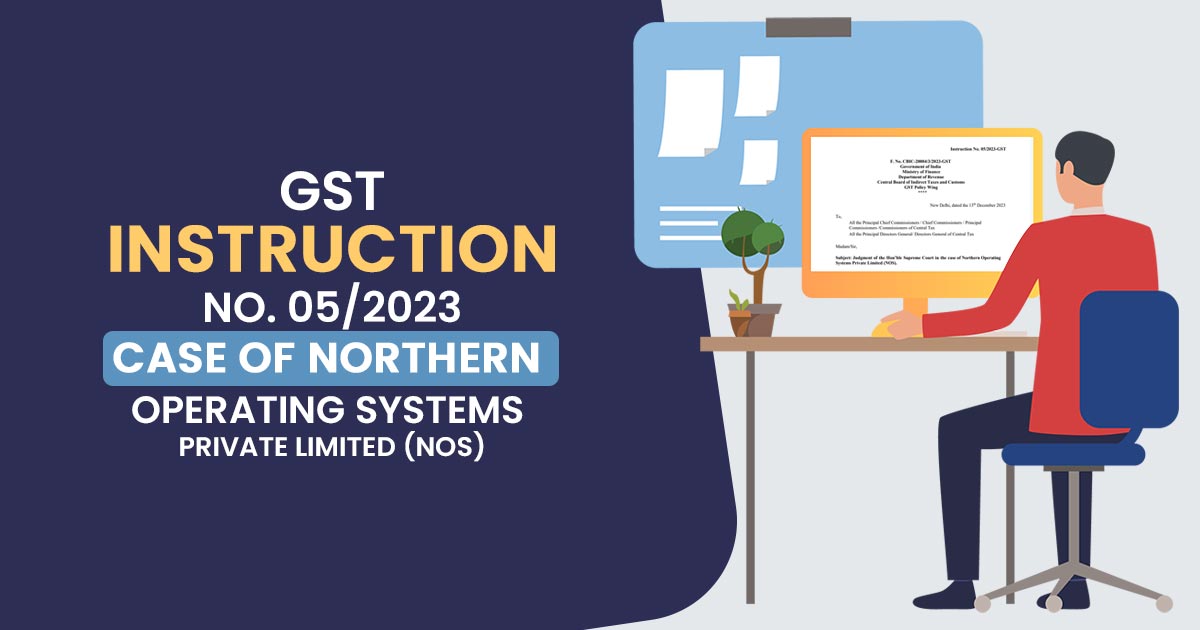
On December 13th, 2023, the Central Board of Indirect Taxes and Customs (CBIC) issued a directive instructing officials that the application of section 74(1) of the CGST Act for issuing show cause notices should only occur when investigations reveal concrete evidence of fraud, deliberate misrepresentation, or withholding of facts to avoid tax. Furthermore, this evidence must be explicitly included in the show cause notice.
This directive aligns with the Supreme Court’s ruling in the Northern Operating Systems case. The Court upheld the Commissioner’s original orders but specified that any recovery attempts for the extended period of limitation should be excluded from the demand against the assessee for two separate periods. This ruling was highlighted in the context of the taxable service regarding the supply of manpower by overseas entities.
The Important Instruction No. 05/2023-GST dated December 13, 2023, from the Central Board of Indirect Taxes and Customs (CBIC) corresponds directly to the verdict of the Honorable Supreme Court in the Northern Operating Systems Private Limited (NOS) case.
This instruction specifically addresses the deployment of overseas entities’ employees to Indian firms and its implications concerning Services Tax. The Board received representations highlighting that, after the mentioned judgment, various field formations initiated proceedings to investigate alleged GST evasion related to the deployment issue under Section 74(1) of the Central Goods and Services Tax Act, 2017.
Please take note of the Hon’ble Supreme Court’s ruling on May 19, 2022, in the case of CC, CE & ST, Bangalore (Adj.) etc. versus Northern Operating Systems Private Limited (NOS).
This ruling pertains to the nature of the deployment of employees from overseas entities to Indian firms and its implications on Service Tax.
The Board has received representations indicating that subsequent to this judgment, several field formations have initiated proceedings alleging GST evasion concerning the deployment issue under section 74(1) of the Central Goods and Services Tax Act, 2017 (CGST Act).
The Board has conducted a thorough review of the matter. It appears that the Hon’ble Supreme Court, in its judgment, considered various aspects of the case, notably the agreement between NOS and overseas group companies.
The Court concluded that the deployment of employees from the overseas group company to NOS constituted a taxable service labeled as ‘manpower supply,’ thereby subjecting it to service Tax.
Importantly, the concept of secondment isn’t confined to Service Tax alone; the question of tax applicability also arises under GST. Upon closer inspection of the NOS judgment, it becomes evident that the Hon’ble Supreme Court emphasized the need for a nuanced examination, tailored to the distinct characteristics of each specific arrangement, rather than relying on a singular test.
Read Also: Calcutta HC Reverses Order U/S 74 as GST Notice Uploaded in Other Portal
Moreover, the observation made by the Hon’ble Supreme Court in the case of Commissioner of Central Excise, Mumbai versus M/s Fiat India(P) Ltd in Civil Appeal 1648-49 of 2004 reinforces this approach.
The Court highlighted that each case stands on its own set of facts and mere similarity between cases isn’t sufficient, as even a single significant detail can entirely alter the context.
Deciding such matters requires avoiding the inclination to match one case’s color against another’s, as the broad resemblance to another case isn’t the decisive factor.
It’s important to recognize that various arrangements exist concerning the secondment of employees from overseas group companies to Indian entities. The tax implications in each arrangement can differ based on the specific terms and conditions outlined in the contract. Consequently, applying the Supreme Court’s decision in the NOS case universally to all scenarios may not be appropriate.
Investigating each case demands a meticulous evaluation of its unique factual context, particularly the contractual terms between the overseas company and the Indian entity.
This assessment is crucial in determining the extent of taxability under GST and applying the principles established by the Supreme Court’s judgment in the NOS case.
It has also been described by the industry that in various cases that consists of secondment, the field formations are mechanically invoking extended period of limitation under section 74(1) of the CGST Act. In this regard, section 74 (1) of CGST Act reads as follows:
“(1) Where it appears to the proper officer that any tax has not been paid or short paid or erroneously refunded or where input tax credit has been wrongly availed or utilized by reason of fraud, or any wilful misstatement or suppression of facts to evade tax,”
Upon examining section 74(1) of the CGST Act, it’s apparent that its invocation is contingent upon instances involving fraud, intentional misrepresentation, or the concealment of facts to evade tax by the taxpayer.
The section cannot be triggered solely due to non-payment of GST unless there is explicit evidence of fraud, intentional misrepresentation, or the concealment of facts to evade tax.
Consequently, the provisions of section 74(1) may only be utilized to issue a show cause notice when an investigation yields substantial evidence indicating fraud, intentional misstatement, or the suppression of facts to evade tax by the taxpayer.
This evidence should be expressly included in the show cause notice, and these considerations are crucial in the investigation process and the issuance of such notices.
Effectively, invoking the extended period of limitation under Section 74(1) of the Central Goods and Services Tax Act, 2017, would be rendered invalid except in instances where there’s clear evidence of fraud, intentional misstatement, or the suppression of facts to evade tax by the taxpayer.
It’s imperative to note that CBIC has explicitly issued instructions preventing the invocation of Section 74(1) solely due to non-payment of GST without evidence of fraud or intentional misrepresentation.








